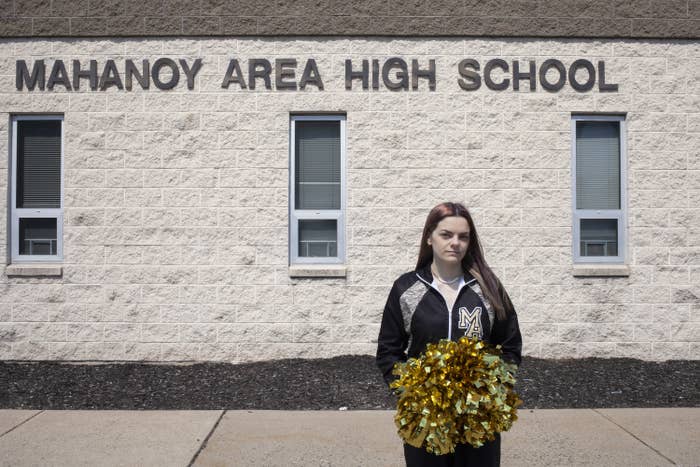
The Supreme Court ruled Wednesday that a Pennsylvania high school violated a cheerleader's First Amendment rights when they disciplined her for writing "fuck cheer" on Snapchat while off campus and after school hours.
In an 8–1 decision, the court ruled that while public schools may have a special interest in regulating some off-campus speech, the circumstances of the cheerleading incident did not meet that bar.
"It might be tempting to dismiss [the cheerleader's vulgar] words as unworthy of the robust First Amendment protections discussed herein," Justice Stephen Breyer wrote in the majority opinion. "But sometimes it is necessary to protect the superfluous in order to preserve the necessary."
What the court did not do, however, was set a clear rule going forward about what counted as "off campus" speech and when the First Amendment protections that students would normally enjoy away from school grounds must "give way" to a school's interests. Breyer predicted there would be future legal fights over this question and wrote that the most guidance the court could offer administrators at this point was that the "leeway" they have to override students' First Amendment rights when they aren't actually at school was "diminished."
The court's decision came from a case involving a Pennsylvania teen, Brandi Levy, who was dismissed from the junior varsity cheerleading squad at Mahanoy Area High School in 2017 after she posted a photo of her and a friend holding up their middle fingers with the words "fuck school fuck softball fuck cheer fuck everything" on a Saturday when she was off campus and not participating in any school-related activities. Levy is now 18 and in college, and her 2017 post came after she failed to make the varsity squad during tryouts at the end of her first year of high school.
The school's cheerleading coaches suspended Levy from the team for a year after another student showed them screenshots of the Snapchat post, arguing that the post was in violation of the team's rules. Among other things, the rules warned, "There will be no toleration of any negative information regarding cheerleading, cheerleaders, or coaches placed on the internet," according to court documents.
The ACLU of Pennsylvania sued the Mahanoy Area School District on Levy's behalf, and in 2019, a US district court judge ruled in her favor, finding that the school had violated her First Amendment rights when they dismissed her from the team. Last summer, the US Court of Appeals for the 3rd Circuit affirmed that decision and also ruled that an earlier standard that's often used to determine when schools can infringe on students' free speech doesn't apply outside of school.
In that Supreme Court precedent, the 1969 decision on Tinker v. Des Moines Independent Community School District, the court held that students do not “shed their constitutional rights to freedom of speech or expression at the schoolhouse gate," and that school officials could not censor student speech unless it "materially and substantially interfere[d]" with school operations.
While the Supreme Court upheld the 3rd Circuit decision in favor of the cheerleader, they did not adopt the lower court's more sweeping reasoning, which would have set clearer limits on when schools can discipline students for off-campus speech.
Instead, the justices found that while schools do have an interest in regulating some off-campus speech — say, when it involves bullying or homework — there were other important considerations. These include the idea that school officials will rarely stand in the place of the student's parents as chief disciplinarians, that schools cannot in practice police what a student says 24 hours a day, and that it is in the interest of schools, as "the nurseries of democracy," to protect unpopular speech.
The court found Levy's speech was protected because she didn't identify or threaten anyone and that it did not cause a "substantial interference" to the school's efforts to maintain cohesion on the cheer squad. Justice Samuel Alito Jr. wrote a concurring opinion where he explored in more details how to weigh the First Amendment against a school's interests, but concluded with a similar warning as Breyer's main opinion that regulating student speech off-campus "raises serious First Amendment concerns, and school officials should proceed cautiously before venturing into this territory."
While eight justices were in the majority, Justice Clarence Thomas filed a dissenting opinion. He accused his colleagues of ignoring the history of legal precedent around school discipline for student speech, and wrote that his review of the record — that is, cases dating back to the 19th century that explored how free speech rights applied to states — supported the argument that schools "could discipline students in circumstances like those presented here."
Justices had seemed to agree during arguments in April there was little evidence that Levy's Snapchat caused any harm. According to the court transcript, Justice Stephen Breyer said that if simply using swear words off campus met the bar for substantially disruptive speech then, "my goodness, every school in the country would be doing nothing but punishing."
But the justices struggled with the question of to what extent schools have the authority to discipline students for speech that is not clearly occurring on campus grounds, raising questions about possible scenarios involving off-campus bullying or harassment.
"We probably can't write a treatise here and shouldn't write a treatise here and can't foresee all the things that could arise and a lot of the hypotheticals that have been raised," Justice Brett Kavanaugh said.
Lisa Blatt, an attorney for the school district, had argued that the Tinker test should apply to speech outside of school because "off-campus speech, particularly on social media, can be disruptive." But the ACLU's national legal director, David Cole, cautioned against allowing schools to regulate speech that is made outside of the school's supervision, arguing that doing so would essentially eliminate students' free speech rights altogether.
"They will essentially be carrying the schoolhouse with them wherever they go," Cole said.
David Mack and Zoe Tillman contributed reporting.
